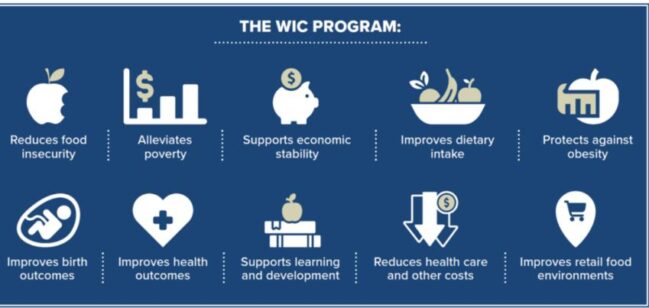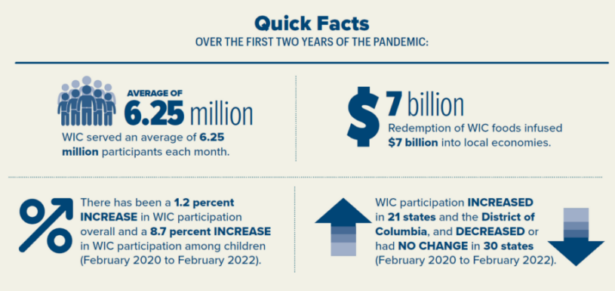October 5, 2022
The Special Supplemental Nutrition Program for Women, Infants, and Children (WIC) is a federal nutrition program that provides nutritious foods, nutrition education, breastfeeding support, and health care referrals for nutritionally at-risk infants, children up to 5 years old, and pregnant and postpartum individuals from households with moderate to low incomes.
WIC is a vital support for families with young children and the communities they reside in, especially during the COVID-19 pandemic. Despite the demonstrated benefits of WIC, too few eligible people participate in the program. In 2019, 57 percent of eligible individuals participated in WIC, equating to a shortfall of almost 5 million additional individuals.

WIC Enhancements Improve Program Access, Value, and Participation
According to a new FRAC report, WIC waivers and enhancements during the pandemic have simultaneously removed access barriers and increased the value of participating in WIC, resulting in overall increases in program participation.

In February 2022, WIC reached 6.2 million participants, a 1.2 percent increase from February 2020.
- Children make up more than half of all WIC participants.
- 3.4 million children participated in WIC in February 2022.
- Enhancements to WIC spurred by the pandemic contributed to a significant 8.7 percent increase in WIC participation among children from February 2020 to February 2022.
- This was the first time child participation in WIC increased in more than a decade
Key enhancements include:
- the ability to access WIC appointments and benefits remotely without having to go into WIC clinics;
- extended certification periods; and
- the increased value of WIC’s fruit and vegetable benefit.
Number of Children Participating in WIC, by Month, February 2020–February 2022

Despite growth during the COVID-19 pandemic, WIC is still reaching too few eligible people. There are tangible strategies to expand WIC’s reach.
To widen WIC’s reach, it is important to act on lessons learned during the pandemic by making permanent the enhancements that have strengthened and improved access for families with young children including:
- making permanent the flexibilities that allow for remote enrollment, services, and benefits issuance, and that allow for facilitation of online ordering and payments; and
- funding and permanently increasing the value of WIC’s fruit and vegetable benefit to levels recommended by the National Academies of Science, Engineering and Medicine.
To make the continuation of these enhancement successful, a full range of crucial improvements are needed including:
- better coordinating of health and participation data between the health care sector and WIC to ensure the ability to continue access to remote WIC services;
- increasing funding for infrastructure, technical assistance, Electronic Benefit Transfer technology, and management information systems to ensure remote service offerings are successful; and
- maximizing opportunities to coordinate with community partners to conduct community-centered and innovative WIC outreach.
Stakeholders and Advocates can help Strengthen and Expand WIC
- Work with your local or state WIC agency to conduct community-centered WIC outreach, and refer potentially eligible families to apply for WIC: Advocates can refer families to apply for WIC through the , calling the toll-free number, or signupwic.com. The WIC Guide for Health Care Providers can be useful in referring patients to WIC across many types of health care settings.
- Communicate with your WIC agency, urging them to swiftly make critical improvements needed in WIC. Critical improvements needed include continuing to offer the full range of WIC services and benefit issuance options allowed, including maximizing remote access to WIC through phone appointments and remote benefit issuance. Working with your WIC agency to maximize innovation, partnerships, and data sharing with Medicaid, Head Start, child care subsidy programs, and the Supplemental Nutrition Assistance Program can help streamline processes at the WIC clinic, limit unnecessary paperwork, and reduce participant burden.
- Urge Congress to Take Action Through Child Nutrition Reauthorization: Advocates can help expand WIC and reduce barriers by urging their members of Congress pass a robust Child Nutrition Reauthorization package this fall through FRAC’s Action Network tool.

